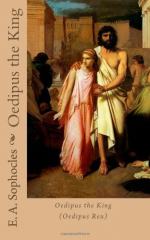|
This section contains 582 words (approx. 2 pages at 300 words per page) |

|
Oedipus the King
Summary: Examines the use of dramatic irony in the play, "Oedipus the King," by Sophocles. Describes how it is used to describe Oedipus' character as arrogant and blind toward the truth. The audience is expected to understand Oedipus' history well before he does. In the first three episodes, Oedipus uses a lot of dramatic irony in his speeches.
In the play "Oedipus the King" by Sophocles, the author presents us with several instances of dramatic irony. Dramatic irony occurs when the meaning of the situation is understood by the audience but not by the characters in the play. Dramatic irony plays an important part in "Oedipus the King", because it is used to describe Oedipus' character as arrogant and blind toward the truth. The audience is expected to understand Oedipus' history well before he does. In the first three episodes, Oedipus uses a lot of dramatic irony in his speeches.
The behavior of Oedipus is ironic, because he is not capable to grasp the
truth that is being unrevealed before his eyes. Oedipus is blinded by his ignorance. He is a very confident man and powerful in the way he acts and talks. Oedipus is so blind to himself, that instead of relying on the oracles...
|
This section contains 582 words (approx. 2 pages at 300 words per page) |

|


